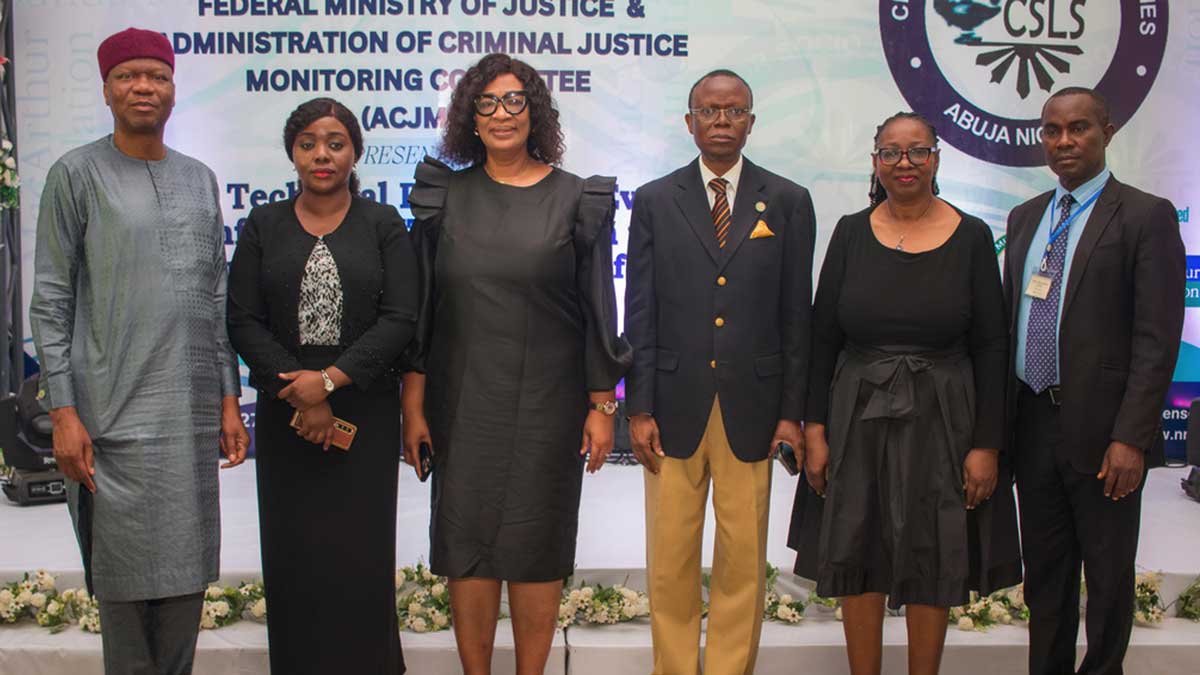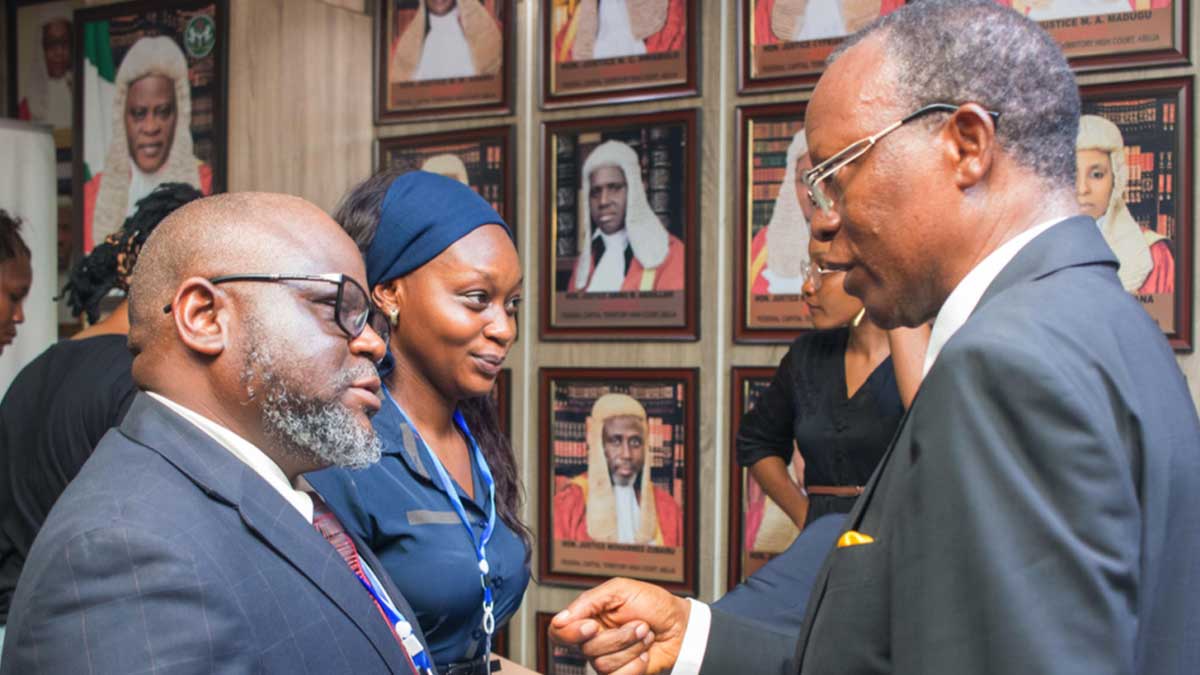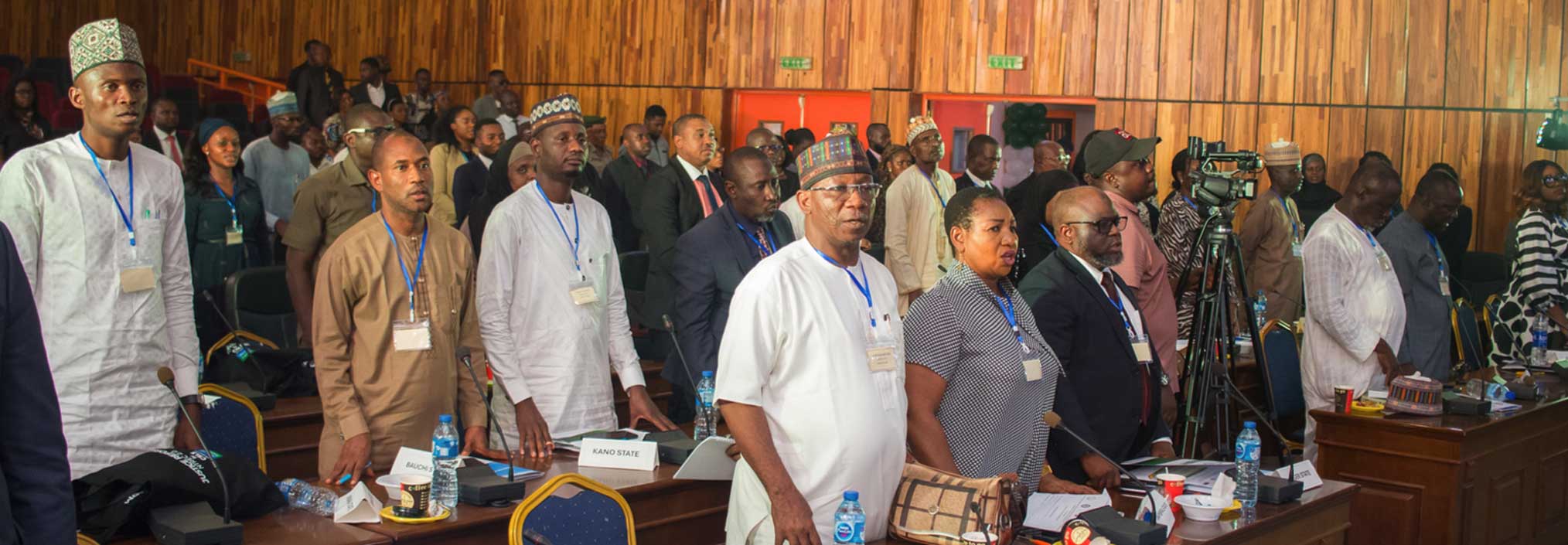Yvonne Darkwa-Poku, Senior Program Officer, On Nigeria, shares how early support for criminal justice leaders in Nigeria led to the institutionalizing, strengthening, and sustaining of reforms.
The enactment of the Administration of Criminal Justice Act (ACJA) has been described as a watershed moment in the history of the criminal justice system in Nigeria.
Due to its numerous innovations, such as faster dispensation of justice, a focus on restorative justice, and technological and record-keeping requirements, the ACJA is considered a revolutionary piece of legislation in criminal justice reform in Nigeria. It has led to harmonization and uniformity in the application of criminal procedure laws across the country. The ACJA's passage was a culmination of intensive advocacy and constructive engagement between government and civil society. No other legislation has achieved such quick state-level adoption in Nigeria.
Prior to the adoption of the ACJA in 2015, Nigeria’s rule of law, especially in the area of criminal justice, was widely recognized as ineffective, inconsistent, and repressive of citizens’ rights. Nigeria’s laws suffered from outdated legal frameworks that led to procedural delays and legal ambiguity, including prolonged pre-trial detention, where some prison inmates were awaiting trial for more than a decade without a verdict. Public confidence in the justice system was low, with many seeing it as slow, corrupt, and accessible only to the wealthy or well-connected.
Several key leaders and grantee partners in Nigeria’s criminal justice reform movement helped pave the way for these significant nationwide reforms.
History of the Administration of Criminal Justice Act (ACJA)
Since the 1990s, MacArthur has supported Nigerian efforts to reform the criminal justice system. Our support began with the National Working Group (NWG) on the Reform of Criminal Justice Administration in Nigeria which comprised of 18 jurists and was led by Chinoye Obiagwu of the Legal Defence and Assistance Project (LEDAP) and Yemi Akinseye-George, who later established the Centre for Socio-Legal Studies (CSLS). The NWG’s mandate was to undertake a comprehensive review of Nigeria’s criminal justice laws and procedures.
In 2015, the NWG’s report and draft Administration of Criminal Justice (ACJ) bill were reviewed for consideration through the Panel on the Implementation of Justice Reform. One of the panel’s key priorities was to update the ACJ bill for presentation to the National Assembly. Professor Adedeji Adekunle, who later established Juritrust Center for Socio-Legal Research and Documentation (Juritrust), served as secretary of the panel.
The ACJA was a testament to our decades-long commitment to Nigeria’s justice reforms, as well as our support to key civil society grantees.
The updated ACJ bill from the NWG, known today as the Administration of Criminal Justice Act, was passed in 2015 when we began our On Nigeria Big Bet. The ACJA was also a testament to our decades-long commitment to Nigeria’s justice reforms, as well as our support to key civil society grantees.
After the passage of the law, the trio of ACJA pioneers—Akinseye-George, Obiagwu, and Adekunle—in close collaboration with the other organizations in our On Nigeria criminal justice cohort, spearheaded efforts for nationwide adoption. By September 2023, eight years after the ACJA passed, all 36 states had adopted state-level equivalents into law, known as the Administration of Criminal Justice Laws (ACJL).

From left, Kole Shettima, Evbu Igbinedion, Leticia Ayoola-Daniels, Yemi Akinseye-George, Olaide Akinseye-George, and Israel Ikechuckwu Alubo. Credit: The Centre for Socio-Legal Studies
Implementation of the law has also proceeded in earnest. A series of MacArthur-funded annual surveys assessing the impact of the ACJA and ACJLs over a period of ten years revealed that the rate of delays in criminal cases at the federal level and in states that had adopted the law had reduced from an average of 44 months in 2012 (pre-ACJA) to 22 months in 2022. With these laws, the wheels of justice were moving faster.
The regulations and processes established by the ACJA have also enabled the continuation of more than 500 high-profile corruption cases in various Nigerian courts.
In addition to this, over 200 high-profile corruption cases in Nigeria have been prosecuted thanks to the ACJA, and the conviction rate is above 50 percent. The regulations and processes established by the ACJA have also enabled the continuation of more than 500 high-profile corruption cases in various Nigerian courts.
Supporting ACJA Pioneers
As On Nigeria drew to a close in 2024, we capitalized on the momentum in the criminal justice sector to institutionalize, strengthen, and sustain ACJA reforms. MacArthur went back to the roots of the criminal justice reform movement to support the work of the trio of ACJA pioneers, Juritrust, CSLS, and LEDAP, to continue to shepherd the ACJA movement through legacy awards.
Juritrust Center for Socio-Legal Research and Documentation (Juritrust)
Today, Juritrust is establishing a first-of-its-kind Administration of Criminal Justice Learning Academy designed to harness the legacy of the On Nigeria criminal justice work. Through collaborative research, capacity building, mentorship, expert forums, and publications, the Academy will strengthen the capacity of criminal justice professionals.
Through collaborative research, capacity building, mentorship, expert forums, and publications, the Academy will strengthen the capacity of criminal justice professionals.
The Academy envisages several footprints for its work. First, the Academy’s curated publications and outputs from visiting experts will impact the development of the jurisprudence of criminal justice in Nigeria. Second, its forthcoming library, virtual and onsite, will aim to be a reference point for criminal justice jurisprudence in Nigeria and Africa broadly. Third, mentoring activities will develop and sustain the capacity of lawyers and judges in understanding and applying criminal justice laws.

Yemi Akinseye-George (right) connects with key criminal justice stakeholders at the National Technical Review and Evaluation Conference. Credit: The Centre for Socio-Legal Studies
These activities include preserving institutional memory on successful approaches to tackling corruption; strengthening stakeholder capacity on the usage of the ACJA and ACJLs; providing timely access to up-to-date materials in criminal proceedings; sharing literature and tools that support gender equity and social inclusion in ACJA and ACJL application; and supplying qualitative inputs and publications to guide legislative and institutional reforms.
Center for Socio-Legal Studies (CSLS)
CSLS is strengthening the criminal justice system in Nigeria by institutionalizing the application of the National Minimum Standards (NMS) and Peer Review Scorecards (PRS) that are intended to monitor and track compliance and implementation of the ACJA and ACJLs at the federal and state levels.
NMS and PRS each promote a uniform approach to ACJA and ACJL implementation across the country; encourage peer review mechanisms among states to foster healthy competition in compliance and effectiveness; and establish a standardized framework for monitoring and evaluating the performance of stakeholders involved in criminal justice administration. These tools have officially been adopted by the National Body of Attorneys-General and the Forum of Solicitors-General of the Federation, as well as by all 36 states.
These tools have officially been adopted by the National Body of Attorneys-General and the Forum of Solicitors-General of the Federation, as well as by all 36 States.
This initiative will also contribute to the review and reform of the ACJA, ensuring it aligns with current criminal justice developments, and incorporates lessons from the legislation’s first ten years of implementation. CSLS is working in partnership with the Federal Ministry of Justice and the Federal Administration of Criminal Justice Monitoring Committee to implement this initiative.
Legal Defence and Assistance Project (LEDAP)
LEDAP’s legacy work involves deepening and institutionalizing the learning management systems for investigators and prosecutors of anti-corruption agencies in Nigeria. Over the last eight years, LEDAP has collaborated with the Economic and Financial Crimes Commission and the Independent Corrupt Practices Commission & Other Related Offences to build the capacity of its officials for effective and efficient investigation and prosecution of corruption and related offenses.
LEDAP is developing e-learning management systems that will deliver modern, updateable, and forensic training modules to officials of the anti-corruption agencies and lawyers in Nigeria. The e-learning system comprises building a studio with complete state-of-the-art recording, editing, and broadcast facilities, with capacity for simultaneous content development and parallel training delivery of up to 20 course modules. Both pre-recorded and live virtual courses, with interactivity between faculty and trainees, allow each trainee to work at their own pace and for the faculty to be flexible in adjusting course content to the needs and skills gaps of individual trainees. The apps were designed as a one-off tool, tailored to the needs of each user, and require no licensing renewal fees, thus making them cost-effective, locally managed, and sustainable.
Exploring Lessons Learned
Working together, the On Nigeria grantee partners contributed to the strengthening of Nigeria’s criminal justice reforms and accountability ecosystem. We encourage you to explore the Criminal Justice Learning Brief in the On Nigeria Big Bet Learning Library to discover more lessons learned as we reflect on the progress and advances in anti-corruption over the past decade.





